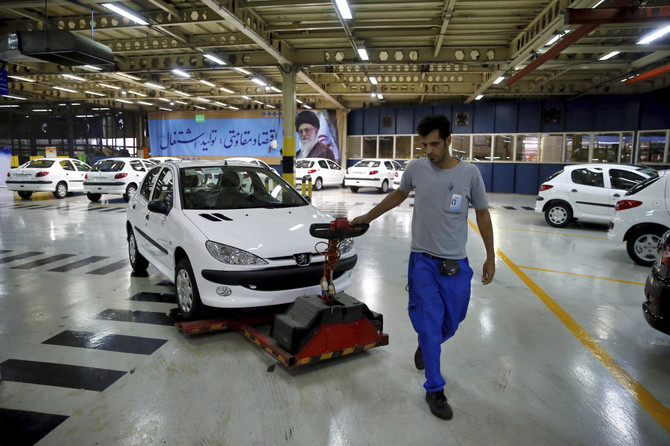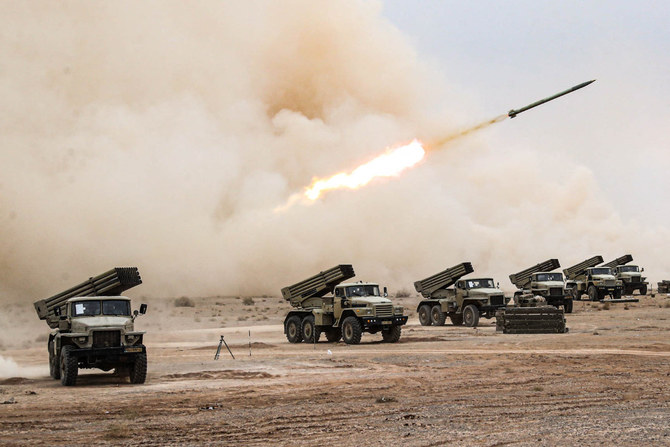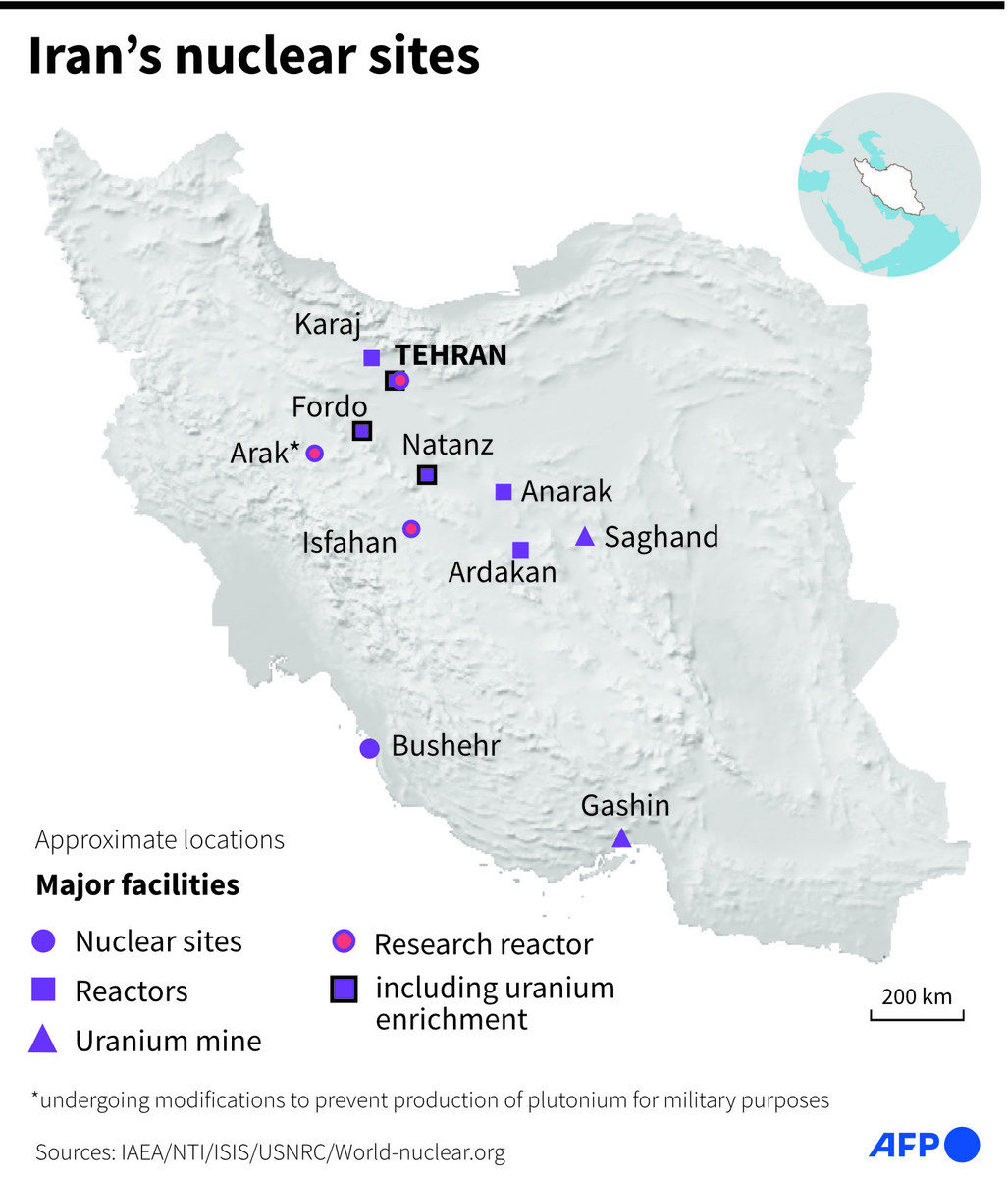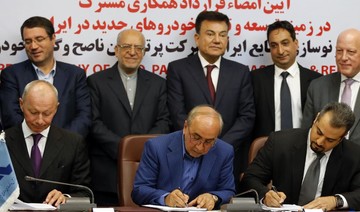TEHRAN, Iran: Across Iran’s capital, rush-hour traffic always grinds to a halt, a sea of boxy Renault four-doors and Peugeot coupes all idling their way through the streets of Tehran.
Soon, however, Iran’s faltering nuclear deal with world powers may be what causes the country’s domestic automotive market to stall out.
As Iran’s currency, the rial, suffers precipitous falls against the US dollar — down some 140 percent since President Donald Trump withdrew America from the accord — cars are growing more and more expensive even as tens of thousands clamor to order domestic models online. Meanwhile, Western manufacturers are pulling out of the country and foreign-produced parts are becoming harder to find as Chinese cars fill the void.
“It is clear and obvious that the US is purposefully putting pressure on the people of Iran to instigate discontent” over the auto market, said Mohammad Reza Najfimaneh, the head of the Iranian Specialized Manufacturers of Auto Parts Association.
Iran, one of the Mideast’s biggest countries and home to 80 million people, has a huge demand for automobiles. In 2017 alone, Iran produced more than 1.5 million cars, up some 14 percent from the year before, according to a report by Iran’s Ministry of Industries, Mines and Trade earlier this year.
Some 90 percent of market share is controlled by two local companies: Iran Khodro, which assembles Peugeot-branded vehicles from kits, and SAIPA, which has made Citroens and Kias. Both manufacturers also build Renaults.
Iran’s auto industry suffered under US and Western sanctions, which targeted Iran over fears about its nuclear program. The West worries Iran could use its technology to build atomic bombs. Iran long has said its program is for peaceful purposes.
The 2015 nuclear deal, which saw Iran limit its enrichment of uranium in exchange for the lifting of some sanctions, provided a needed boost to the industry.
French car-maker PSA Peugeot Citroen reached a deal in 2016 to open a plant producing 200,000 vehicles annually in Iran. Fellow French automobile manufacturer Groupe Renault signed a $778-million deal to build 150,000 cars a year at a factory outside of Tehran. Meanwhile, Volkswagen announced plans to import vehicles into Iran.
Now, however, those firms have pulled back on those plans.
Concern over Iran’s domestic auto industry has been high. That was shown in a visit to Iran-Khodro last week by Ali Shamkhani, the secretary of Iran’s Supreme National Security Council.
“The enemy in the economic war is after damaging public contentment and the auto industry is one of the front lines in the war,” Shamkhani said during his visit.
More than 100,000 people are employed by Iran-Khodro and SAIPA, while another 700,000 Iranians work in industries related to car manufacturing.
There are fears by some business analysts in Iran that any downturn in the auto industry would further worsen unemployment in the country.
Iran’s official unemployment rate is 12.3 percent, meaning some 3 million people are out of work, but experts believe it is much higher, especially among university graduates. Those unemployed often try to scrape enough money together to work as taxi drivers in the city, meaning they could be doubly hit.
Meanwhile, the drop in the Iranian rial has made buying a car difficult. The rial traded at 62,000 to the dollar before Trump’s pullout from the nuclear deal in May. It has gone as high as 150,000 to $1 since.
“I saved some money to buy an Iranian car, but prices jumped and factories do not provide cars on time,” said Mahin Tabrizi, a 45-year-old teacher. “I don’t know what I can do.”
Those prices also have hurt auto parts sales.
“Prices of car parts are crazy, all because of the sanctions,” said Mahmoud Rahimi, a taxi driver. “I bought brake pads for my car for double the price in less than a year.”
Even those who pay for an Iranian car can face delays in having them delivered. Iranian car production reportedly dropped 29 percent in June compared to the same month last year. Analysts blamed that on lack of parts due to currency fluctuation.
Meanwhile, importing a foreign car grows more expensive as the rial drops in value. Iran places import taxes of more than 100 percent on foreign cars. A ban on importing foreign cars also has been in force since April, halting new orders.
“Nearly two years ago, I paid for an imported car, yet they have not delivered it due to upheavals in the rial rate and sanctions,” said Reza Piltan, a retired engineer waiting for an SUV by South Korean manufacturer SSangYong.
In the absence of Western car makers, however, China is already starting to show up in the country. A new dealership for Chinese automaker Chery recently opened in Tehran. Iranian lawmaker Vali Maleki, a member of the parliamentary committee on industry, last month suggested that Chinese companies can take over the share of other foreign companies that have left the Iranian market.
“The Chinese cars are selling very well in Iran,” car dealer Ali Razavi said. “Their dealerships offer a wide range of methods of leasing and financing that enable many customers to buy a new car for just about $2,000 to $4,000.” Those cars are partly assembled in Iran.
Demand is still strong for Iranian-made cars as well, however.
Last week, in less than an hour, 50,000 customers rushed the website of SAIPA to pay nearly $2,000 each to buy cars that the company plans to make in the future. The move is largely an effort by buyers to save on their purchases as the rial continues to fall. Another factory, Iran-Khodro, has a similar plan for selling future cars next week.
Still, anger over quality lurks.
“In other countries people pay small advance fees to buy a standard car based on installments,” said Fatemeh Azari, whose son last week managed to buy a car on SAIPA’s website. “Here, we pay all the money in advance to receive a clunker months later.”
Iran’s domestic car market stalls as nuclear deal falters
Iran’s domestic car market stalls as nuclear deal falters

- Iran’s auto industry suffered under US and Western sanctions, which targeted Iran over fears about its nuclear program
- There are fears by some business analysts in Iran that any downturn in the auto industry would further worsen unemployment in the country
flydubai airline cancels flights to Iran: statement

- Flight-tracking software shows commercial flights avoiding western Iran, including Isfahan, and skirting Tehran to the north and east
“In line with the issued NOTAM (notice to air missions), our flights to Iran today have been canceled,” said the statement sent to AFP.
One flight which had already departed for Tehran returned to Dubai after the Iranian capital’s airport was closed, it added.
Flights were suspended across swathes of Iran as Iranian state media reported explosions in the central province of Isfahan.
Flight-tracking software showed commercial flights avoiding western Iran, including Isfahan, and skirting Tehran to the north and east.
There was no immediate comment from Dubai’s state-owned Emirates airline, flydubai’s sister carrier, which was operating several of the planes.
Emirates and flydubai have experienced serious disruption this week after record rainfall caused more than 1,000 flight cancelations at Dubai airport, one of the world’s busiest air hubs.
Iran closes air space, commercial flights diverted after apparent Israeli retaliatory strikes

- Drones shot down over Isfahan, says Iranian state media
- Israel military refuses to comment on incident
DUBAI/WASHINGTON: Israeli missiles have hit a site in Iran, ABC News reported late on Thursday, citing a US official, while Iranian state media reported an explosion in the center of the country, days after Iran launched a retaliatory drone strike on Israel.
Commercial flights began diverting their routes early Friday morning over western Iran without explanation as one semiofficial news agency in the Islamic Republic claimed there had been “explosions” heard over the city of Isfahan.
Some Emirates and Flydubai flights that were flying over Iran early on Friday made sudden sharp turns away from the airspace, according to flight paths shown on tracking website Flightradar24.
“Flights over Isfahan, Shiraz and Tehran cities have been suspended,” state media reported.
Iranian officials said its air defenses did shot down several drones but there had been “no missile attack for now” on the country.
The state-run IRNA news agency reported that Iran fired air defense batteries early Friday morning across several provinces after reports of explosions near the city of Isfahan.
Several drones “have been successfully shot down by the country’s air defense, there are no reports of a missile attack for now,” Iran’s space agency spokesman Hossein Dalirian says on X.
The Fars news agency said “three explosions” were heard near the Shekari army airbase near Isfahan.
Iran’s local media also reported that nuclear facilities in Isfahan were “completely secure” after explosions were heard near the area.
“Nuclear facilities in Isfahan province are completely secure,” Tasnim news agency reports, quoting “reliable sources.”
Israel had said it would retaliate against Iran’s weekend attack, which involved hundreds of drones and missiles in retaliation for a suspected Israeli strike on its embassy compound in Syria. Most of the Iranian drones and missiles were downed before reaching Israeli territory.
Several Iranian nuclear sites are located in Isfahan province, including Natanz, centerpiece of Iran’s uranium enrichment program. Isfahan, Isome 350 kilometers (215 miles) south of Iran’s capital, Tehran, is also home to a major air base for the Iranian military.
Meanwhile in Iraq where a number of Iranian-backed militias are based, residents in Baghdad reported hearing sounds of explosions, but the source of the noise was not immediately clear.
In Syria, a local activist group said strikes hit an army position in the south of the country Friday.
“There were strikes on a Syrian army radar position,” said Rayan Maarouf, who runs the Suwayda24 anti-government website that covers news from Sweida province in the south.
Iranian military positions in Syria had been frequently targetted by Israeli air strikes over the past years. Early this month, an Israeli strike demolished a consular building annex of the Iranian Embassy in Sydia's capital Damascus, killing 13 people, including two generals of Iran's Revolutionary Guards, triggering the Iranian missiles and drones attack on Israel on April 13.
At the United Nations Security Council on Thursday, Iran urged member nations that Israel “must be compelled to stop any further military adventurism against our interests” as the UN secretary-general warned that the Middle East was in a “moment of maximum peril.”
Israel had said it was going to retaliate against Iran’s April 13 missile and drone attack.
Analysts and observers have been raising concerns about the risks of the Israel-Gaza war spreading into the rest of the region.
Oil prices and jumped on the reports of the Israeli strike. Brent crude futures rose 2 percent to $88.86 a barrel, the dollar gained broadly, gold rose 1 percent and S&P 500 futures dropped 1 percent.
Israel’s assault on Gaza began after Palestinian Islamist group Hamas attacked Israel on Oct. 7, killing 1,200, according to Israeli tallies.
Israel’s military offensive has killed over 33,000 Palestinians in Gaza, according to the local health ministry.
Iran-backed groups have declared support for Palestinians, launching attacks from Lebanon, Yemen and Iraq.
Iran closes air space, commercial flights diverted after apparent Israeli retaliatory strikes

- Drones shot down over Isfahan: Iranian state television
- Israel military refuses to comment on incident
DUBAI/WASHINGTON: Israeli missiles have hit a site in Iran, ABC News reported late on Thursday, citing a US official, while Iranian state media reported an explosion in the center of the country, days after Iran launched a retaliatory drone strike on Israel.
Commercial flights began diverting their routes early Friday morning over western Iran without explanation as one semiofficial news agency in the Islamic Republic claimed there had been “explosions” heard over the city of Isfahan.
Some Emirates and Flydubai flights that were flying over Iran early on Friday made sudden sharp turns away from the airspace, according to flight paths shown on tracking website Flightradar24.
“Flights over Isfahan, Shiraz and Tehran cities have been suspended,” state media reported.
Iranian officials said its air defenses did shot down several drones but there had been “no missile attack for now” on the country.
The state-run IRNA news agency reported that Iran fired air defense batteries early Friday morning across several provinces after reports of explosions near the city of Isfahan.
Several drones “have been successfully shot down by the country’s air defense, there are no reports of a missile attack for now,” Iran’s space agency spokesman Hossein Dalirian says on X.
The Fars news agency said “three explosions” were heard near the Shekari army airbase near Isfahan.
Iran’s local media also reported that nuclear facilities in Isfahan were “completely secure” after explosions were heard near the area.
“Nuclear facilities in Isfahan province are completely secure,” Tasnim news agency reports, quoting “reliable sources.”
Israel had said it would retaliate against Iran’s weekend attack, which involved hundreds of drones and missiles in retaliation for a suspected Israeli strike on its embassy compound in Syria. Most of the Iranian drones and missiles were downed before reaching Israeli territory.
Several Iranian nuclear sites are located in Isfahan province, including Natanz, centerpiece of Iran’s uranium enrichment program. Isfahan, Isome 350 kilometers (215 miles) south of Iran’s capital, Tehran, is also home to a major air base for the Iranian military.

Meanwhile in Iraq where a number of Iranian-backed militias are based, residents in Baghdad reported hearing sounds of explosions, but the source of the noise was not immediately clear.
In Syria, a local activist group said strikes hit an army position in the south of the country Friday.
“There were strikes on a Syrian army radar position,” said Rayan Maarouf, who runs the Suwayda24 anti-government website that covers news from Sweida province in the south.
Iranian military positions in Syria had been frequently targetted by Israeli air strikes over the past years. Early this month, an Israeli strike demolished a consular building annex of the Iranian Embassy in Sydia's capital Damascus, killing 13 people, including two generals of Iran's Revolutionary Guards, triggering the Iranian missiles and drones attack on Israel on April 13.
At the United Nations Security Council on Thursday, Iran urged member nations that Israel “must be compelled to stop any further military adventurism against our interests” as the UN secretary-general warned that the Middle East was in a “moment of maximum peril.”
Israel had said it was going to retaliate against Iran’s April 13 missile and drone attack.
Analysts and observers have been raising concerns about the risks of the Israel-Gaza war spreading into the rest of the region.
Oil prices and jumped on the reports of the Israeli strike. Brent crude futures rose 2 percent to $88.86 a barrel, the dollar gained broadly, gold rose 1 percent and S&P 500 futures dropped 1 percent.
Israel’s assault on Gaza began after Palestinian Islamist group Hamas attacked Israel on Oct. 7, killing 1,200, according to Israeli tallies.
Israel’s military offensive has killed over 33,000 Palestinians in Gaza, according to the local health ministry.
Iran-backed groups have declared support for Palestinians, launching attacks from Lebanon, Yemen and Iraq.
Hamas slams US veto of Palestinian UN membership bid

PALESTINIAN TERRITORIES: Palestinian militant group Hamas condemned on Friday the US veto that ended a long-shot Palestinian bid for full United Nations membership.
“Hamas condemns the American veto at the Security Council of the draft resolution granting Palestine full membership in the United Nations,” the Gaza Strip rulers said in a statement, which comes amid growing international concern over the toll inflicted by the war in the besieged Palestinian territory.
The veto by Israel’s main ally and military backer had been expected ahead of the vote, which took place more than six months into Israel’s offensive in Gaza, in retaliation for the deadly October 7 attack by Hamas militants.
Twelve countries voted in favor of the draft resolution, which was introduced by Algeria and “recommends to the General Assembly that the State of Palestine be admitted to membership of the United Nations.” Britain and Switzerland abstained.
Gazans search for remains after deadly Rafah strike

An Israeli strike hit the home where a displaced Palestinian family was sheltering in the southern city of Rafah, relatives and neighbors told AFP as they scraped at the soil with their hands.
Al-Arja said the blast killed at least 10 people.
“We retrieved the remains of children and women, finding arms and feet. They were all torn to pieces.
“This is horrifying. It’s not normal,” he said, hauling concrete and broken olive branches from the wreckage. “The entire world is complicit.”
Soon after the war began on Oct. 7, Israel told Palestinians living in the north of Gaza to move to “safe zones” in the territory’s south, like Rafah.
But Israeli Prime Minister Benjamin Netanyahu has since vowed to invade the city, where around 1.5 million people live in shelters, more than half the territory’s population.
“How is Rafah a safe place?” said Zeyad Ayyad, a relative of the victims. He sighed as he cradled a fragment of the remains.
“I heard the bombing last night and then went back to sleep. I did not think it hit my aunt’s house.”
The search for remains was long and painful. The strike left a huge crater and children picked through the rubble while neighbors removed debris, tarpaulin, a pink top.
“We can see them under the rubble and we’re unable to retrieve them,” Al-Arja said.
“These are people who came from the north because it was said the south is safe.”
“They struck without any warning,” he said.
In a separate strike on the house in Rafah’s Al-Salam neighborhood overnight on Tuesday, rescue crews recovered the corpses of eight family members, including five children and two women, Gaza’s civil defense service said.
“An Israeli rocket hit a house of displaced people,” said resident Sami Nyrab.
“My sister’s son-in-law, her daughter, and her children were having dinner when an Israeli missile demolished their house over their heads.”
















